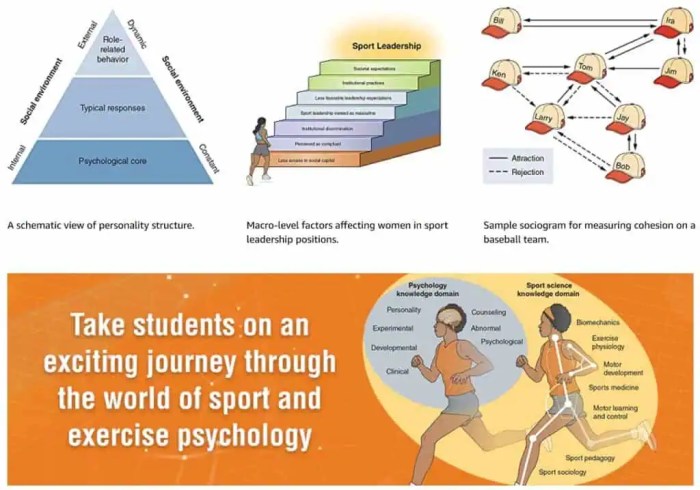Foundations of sports and exercise psychology 7th edition pdf free – Foundations of Sports and Exercise Psychology, 7th Edition PDF Free delves into the captivating world of the human mind and its profound impact on athletic performance. This comprehensive guide explores the historical, biological, psychological, and social foundations that shape our understanding of sports and exercise psychology.
Through in-depth analysis and real-world examples, this book provides a holistic view of the factors that influence our physical and mental well-being in the context of sports and exercise. Whether you’re an athlete, coach, or simply someone interested in the intricate interplay between mind and body, this resource offers invaluable insights and practical applications.
Historical Foundations of Sports and Exercise Psychology

Sports and exercise psychology emerged as a distinct field in the late 19th and early 20th centuries, influenced by advancements in psychology and the growing popularity of sports.
Early Influences
Wilhelm Wundt, the father of experimental psychology, established the first psychological laboratory in 1879. His work on reaction time and attention laid the groundwork for understanding the psychological processes involved in sports performance.
Contributions of Ivan Pavlov and John B. Watson
Ivan Pavlov’s research on classical conditioning demonstrated how environmental stimuli can influence behavior. This theory has been applied to sports psychology to explain how athletes learn new skills and respond to cues.John B. Watson’s theory of behaviorism emphasized the role of reinforcement and punishment in shaping behavior.
This perspective has been influential in developing techniques for motivating athletes and managing their behavior.
Biological Foundations of Sports and Exercise Psychology
The nervous system plays a crucial role in sports and exercise performance. The central nervous system controls movement, coordination, and reaction time, while the autonomic nervous system regulates physiological responses such as heart rate and respiration.
Hormones and Neurotransmitters, Foundations of sports and exercise psychology 7th edition pdf free
Hormones such as adrenaline and cortisol are released during exercise, influencing physical performance and mental state. Neurotransmitters, like dopamine and serotonin, are involved in motivation, mood, and pain perception.
Impact of Genetics
Genetics influence athletic ability and exercise behavior. Some individuals have inherited traits that predispose them to certain sports or physical activities, while others may have genetic limitations.
Psychological Foundations of Sports and Exercise Psychology
Cognitive processes, such as attention, memory, and decision-making, are essential for sports performance. Attentional focus, for example, can enhance performance by allowing athletes to concentrate on relevant cues.
Motivational Theories
Motivation is a key factor in sports and exercise. Theories such as expectancy-value theory and self-determination theory explain why people participate in sports and exercise and how motivation can be enhanced.
Influence of Psychological Factors
Psychological factors, such as self-confidence, anxiety, and stress, can significantly impact athletic performance. Sports psychologists use techniques to help athletes manage these factors and optimize their mental state.
Social Foundations of Sports and Exercise Psychology

Social factors, including culture, gender, and socioeconomic status, influence sports and exercise participation. Cultural norms and expectations shape how people view and engage in physical activity.
Impact of Social Support and Competition
Social support from coaches, teammates, and family can positively impact athletic performance. Competition can also motivate athletes to push their limits, but it can also lead to negative outcomes if not managed properly.
Influence of Social Factors
Social factors can influence exercise behavior by shaping attitudes, beliefs, and access to resources. For example, socioeconomic disparities can limit opportunities for physical activity and contribute to health inequalities.
Applications of Sports and Exercise Psychology: Foundations Of Sports And Exercise Psychology 7th Edition Pdf Free
Sports and exercise psychology is used to enhance athletic performance, rehabilitate injuries, and promote physical activity.
Enhancing Athletic Performance
Sports psychologists work with athletes to improve their mental skills, such as focus, confidence, and motivation. They use techniques like visualization, mental imagery, and relaxation training to optimize performance.
Injury Rehabilitation and Prevention
Sports and exercise psychologists help injured athletes cope with pain, setbacks, and the rehabilitation process. They use psychological strategies to reduce anxiety, enhance motivation, and promote adherence to treatment plans.
Promoting Physical Activity
Sports and exercise psychologists develop interventions to encourage physical activity and healthy lifestyles. They work with individuals and communities to overcome barriers to exercise and create sustainable behavior change.
Quick FAQs
What are the key historical influences on sports and exercise psychology?
Wilhelm Wundt, Ivan Pavlov, and John B. Watson played pivotal roles in shaping the early foundations of the field.
How does the nervous system contribute to sports and exercise performance?
The nervous system plays a crucial role in regulating motor control, coordination, and reaction time.
What psychological factors can influence athletic performance?
Factors such as attention, memory, decision-making, and motivation can significantly impact an athlete’s performance.
How can social factors influence sports and exercise participation?
Culture, gender, socioeconomic status, and social support can influence an individual’s involvement in sports and exercise.
What are some practical applications of sports and exercise psychology?
Sports and exercise psychology can be applied to enhance athletic performance, facilitate injury rehabilitation, and promote physical activity and healthy lifestyles.